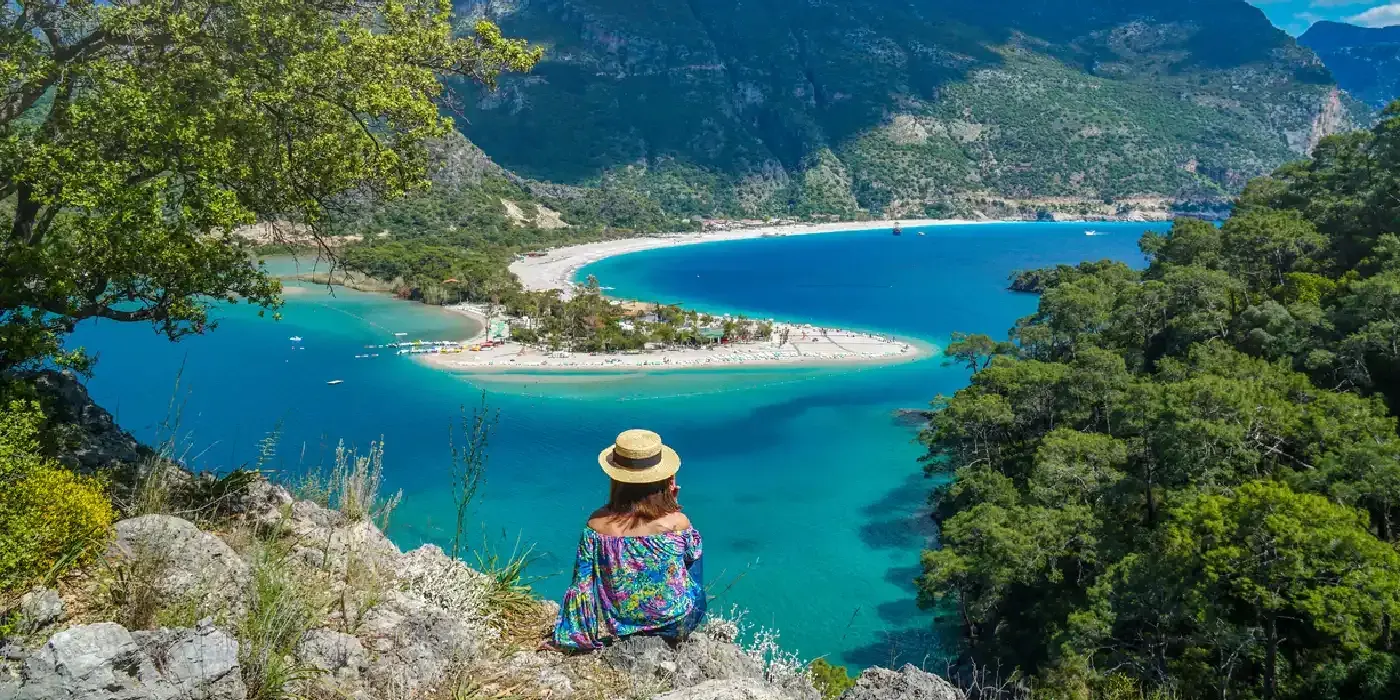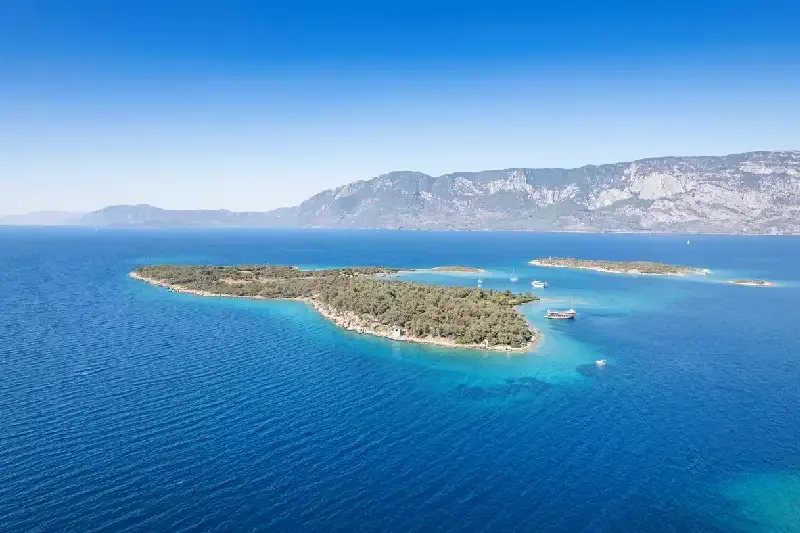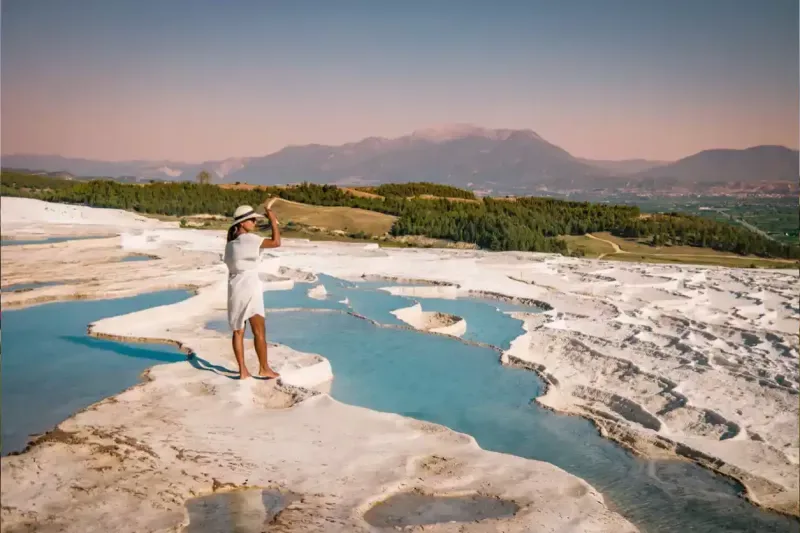Summer in Turkey: Top Destinations to Visit

Turkey's summer temperatures climb dramatically to 35°C (95°F) or more, especially in coastal areas like Antalya. The country experiences hot, dry weather between June and September. Daytime temperatures average around 30°C with very little rain. Travelers can enjoy Turkey's amazing beaches, affordable places to stay, and fewer tourists compared to other European destinations during this time.
The beach towns in Turkey cater to every kind of visitor in the summer months, making them a highlight of many Turkey tours. Bodrum attracts people with its laid-back daytime vibe and exciting nightlife. Antalya's beautiful beaches offer warm azure waters, though they tend to get crowded. Turunç stands out as a peaceful option just a 30-minute water taxi ride away from the lively Marmaris. The Turkish coastline is perfect for cruising adventures, and the season runs from mid-May to mid-October. The peak temperatures in July might make extensive exploration challenging.
Summer in Turkey: What to Expect
Turkey's unique climate zones create different summer experiences throughout the country. Travelers can plan the perfect Turkish summer getaway by knowing these regional weather patterns.
When does summer start and end?
Summer in Turkey runs from June through August. Most people call the practical summer season the period from mid-May until mid-October, particularly for coastal activities. The Turkish Riviera comes alive with sun-drenched days that let you discover stunning countryside and islands. Beach lovers and sailors have plenty of time to enjoy Turkey's beautiful coastlines during this extended warm period.
Rainfall and humidity levels
Summer brings dry conditions to most of Turkey. July and August are the driest months in inland and south-central areas. The Mediterranean coast barely sees any rain from June to September. These conditions make beach activities perfect.
The eastern Black Sea region stays more humid year-round. This area gets plenty of rain even in summer, though it comes in short bursts that last a few days. Most parts of Turkey have humidity levels around 50-60% during July. This makes hot areas feel even warmer.
Best months to visit
The right timing makes a big difference for your Turkish adventure. June and September give you the best conditions for cruising without intense heat. May and October let you avoid the crowds.
Beach lovers should head to Turkey between June and August. The Mediterranean waters become crystal clear during these months. People who want to see archeological sites might prefer spring or fall. Summer heat can make exploring ancient ruins tough, especially in places without much shade.
Customize Your Dream Vacation!
Get in touch with our local experts for an unforgettable journey.
Plan Your Trip
Top Beach Towns in Turkey
Turkish coastlines offer some of the world's most impressive beach towns that express unique character and summer fun.
Bodrum: Chic beaches and nightlife
Bodrum is one of Turkey's most stylish resort towns with unspoiled beaches and lively entertainment. The crystal-clear, shallow waters of Akyarlar Beach make it ideal for family holidays with sporty kids. The town becomes a lively nightlife spot that is as good as Mykonos but cheaper than Ibiza or St. Tropez. Guests have access to elegant rooftop bars and private beach clubs such as Maçakızı. The elegant Catamaran Club boasts a glass dance floor that opens up to see the sea beneath. High-end restaurants line the waterfront, while beach clubs and infinity pools gaze over the beauty of the Aegean.

Antalya: Beach resorts and Roman ruins
Antalya combines ancient history with contemporary beach facilities nicely. Konyaalti Beach is a mile-long beach with parking that is easily accessible under palm trees and gentle waves that suit cautious swimmers and families. Perge Ancient City is only 15 km north of the Antalya airport. This ancient gem flourished in the Hellenistic Period (3rd-1st centuries BCE). The city's buildings date back to its golden era in the 2nd century CE during Roman rule, which earned it its UNESCO designation. Mermerli Beach offers an intimate experience near the city's oldest section, surrounded by rocky cliffs in a charming cove.

Marmaris: Lively Marina and Beach Culture
Marmaris is one of Turkey's famous resort towns, featuring a lively marina culture and beaches that are among the world's best. Sunbathing is best enjoyed at the city beach, with softer sand and quieter waters closer to İçmeler Beach. Marmaris is also a hub for boat tours and day cruises along the Turquoise Coast, including trips to secluded bays and nearby islands. Its vibrant nightlife, sea-front restaurants, and multi-colored bazaars make it the perfect destination for visitors who want both relaxation and thrills during their summer holiday.

Kaş: Diving and turquoise waters
Kaş, on the south-west coast of Turkey, offers excellent diving with 40m visibility twelve months of the year. Sparkling waters present ideal conditions for discovering ancient ruins, shipwrecks, and rock formations. Barracuda, grouper, nudibranch, rays, and turtles can be regularly spotted by divers. Water temperature is a comfortable 28°C (82ºF) in August. This relaxed town satisfies post-dive cravings with delicious meals and accommodations that suit every budget.

Çeşme: Windsurfing and thermal springs
Çeşme's Alaçatı Bay is listed among the world's top three windsurfing destinations. The shallow blue waters of the protected bay are visited by enthusiasts and world champions like Antoine Albeau. The windsurfers enjoy perfect conditions from April to October. The flat water of the region appeals to speed lovers and beginners alike. Çeşme boasts thermal springs and establishments ranging from a simple natural environment to luxury spa treatments with healing mud baths.

Fethiye: Paragliding and Blue Lagoon
Fethiye provides visitors with the chance to paraglide over Ölüdeniz's stunning Blue Lagoon from Babadağ Mountain, which is one of the world's highest commercial take-off sites at 1960 meters. Tandem rides last 25-30 minutes and provide stunning bird's-eye views of the coastline. Professional pilots handle the entire flight experience. The Blue Lagoon is mesmerizing, especially from a paraglider's perspective or hiking the Lycian Way.

Best Cities to Explore in Summer
Turkish cities offer rich cultural experiences beyond their coastal attractions even in the hottest months. Ancient ruins and modern attractions give compelling reasons to explore inland during summer.
Istanbul: Culture, bazaars, and Bosphorus cruises
Summer visitors can experience Istanbul's energy and charm despite warm temperatures. The Bosphorus cruise experience stands without doubt as the city's highlight and gives unique points of view of this transcontinental metropolis. These cruises show stunning views of European and Asian sides while passing historical landmarks and waterfront neighborhoods. The sunset cruises create magic with enchanting views of the city's silhouette against the evening sky.

Izmir: Coastal charm and ancient ruins
Turkey's third-largest city blends seaside relaxation with exceptional historical sites. Izmir sits on the western Aegean coastline and creates an easygoing atmosphere perfect for summer exploration. The Roman-era Agora of Smyrna stands in the city center, while nearby excursions reveal archeological treasures. Ephesus makes a great day trip that showcases one of the Mediterranean's best-preserved classical cities, with its Library of Celsus and Temple of Artemis remains. The ancient city of Pergamon's dramatic hilltop acropolis creates another fascinating excursion.

Ankara: Quieter capital with museums
The capital has a less crowded summer compared to sea resorts. Ankara's family-friendly attractions include the spacious Anıtkabir (tomb of Atatürk) and some museums. Science enthusiasts enjoy the interactive museums at Rahmi M. Koç Museum, and history enthusiasts see Turkish civilization in ancient times through artifacts at the Ethnography Museum. Different parks are perfect places for a summer evening outing, including Gençlik Parkı with its amusement parks.

Pamukkale: Thermal pools and ancient Hierapolis
This remarkable UNESCO World Heritage Site creates a surreal landscape of white calcium terraces that cascade down a hillside. The "Cotton Castle" forms petrified waterfalls and terraced pools that are perfect for wading. The ancient Hierapolis sits next to these thermal pools, a 2nd century BCE thermal spa built by Pergamon kings. Visitors explore well-preserved ruins, including an amphitheater, temples, and the grand necropolis, then cool off in Cleopatra's Pool where thermal waters stay at 33 degrees.

Cooler Escapes and Unique Experiences
Turkey's cooler destinations provide a perfect escape from the summer heat along its coastlines. Travelers can discover amazing adventures while experiencing a different side of Turkish summer away from the beaches.
Black Sea Highlands: Ayder and Uzungöl
The Black Sea Region stands in stark contrast to Turkey's Mediterranean coast. Ayder Plateau sits 19 km from Çamlıhemşin and stays cool through August because of its high altitude. This emerald-green plateau backs up against the Kaçkar Mountains and shows off misty peaks, alpine meadows, and tea plantations. Beautiful spruce, chestnut, beech, and fir forests surround the area. Visitors can walk to Gürgendibi and Gelintülü Waterfalls right from the plateau. Uzungöl's long lake creates a peaceful scene nestled between mountains covered in pine forests.
Cappadocia: Cave cities and hot air balloons
Cappadocia's dreamlike landscapes and unusual rock formations hold centuries of history beneath the surface. The underground cities of the area were havens for early Christians who were trying to escape persecution. Derinkuyu descends some 280 feet with its maze of rooms and tunnels. Summer offers perfect conditions for hot air balloon flights with more reliable winds and fewer cancelations.

Lake Van: Offbeat lakeside adventure
Turkey's largest salt water lake surprises visitors with its beauty and history. Armenia's Holy Cross Cathedral is situated on the Akdamar Island, boasting medieval design and stunning carvings. The lake's waters never solidify even at high altitude, creating beautiful blue waters reflecting off white backgrounds in winter. Visitors may swim in the mineral-rich water or hike around trails nearby. Trekkers are surprised by the vivid blue crater lakes in the Nemrut Crater near Tatvan.
Sailing Turkish Riviera
A journey on a traditional wooden gulet along the Turkish Riviera lets travelers experience the coast's true charm. The Blue Cruise trail follows sailors along pine-covered bays, ancient ruins, and small fishing villages. A popular choice among tourists is the six-day journey from Göcek that includes a visit to Boynuzbükü Cove, Fethiye, St. Nicholas Cove, and Cleopatra's Hammam Cove.
Local summer festivals and festivities
Turkey's summer calendar during 2025 is rich in cultural events. July 1-17 is the Istanbul Jazz Festival, and Victory Day is celebrated across the country on August 30. Summer nights are busy with open-air concerts in Bodrum, outdoor film screenings in Izmir, and local festivals in small towns.

What to Pack for Summer Vacation in Turkey
Packing smart for summer in Turkey will make your trip comfortable and enjoyable. Light, airy clothing like cotton or linen is needed to cope with temperatures of up to 30–35°C, particularly in coastal regions like Antalya and Bodrum. City tours and visits to historical attractions demand comfortable walking shoes and a hat or cap to protect yourself from the sun. Sunscreen, sunglasses, and a refillable water bottle are not to be forgotten when needing to stay cool on a hot day. You will require swimwear at beach resorts like Marmaris or Fethiye, but don't forget to pack a cover-up to be worn outside the beach. It may get cool in the evenings at places like Cappadocia, so a light cardigan or jacket is useful.
FAQS
Q1. What are the summer months in Turkey?
Summer in Turkey runs from June to August, but for beach lovers, the extended warm season lasts from mid-May to mid-October, especially along the Mediterranean coast.
Q2. Is Turkey good to visit in summer?
Absolutely! Summer in Turkey is perfect for enjoying turquoise waters, ancient ruins, and vibrant beach towns in Turkey like Bodrum, Antalya, and Marmaris.
Q3. Which part of Turkey is coolest in summer?
While coastal areas get hot, the eastern Black Sea region stays cooler and more humid. Places like Rize and Trabzon are great for escaping the summer heat.
Q4. How to dress for summer in Turkey?
Pack lightweight, breathable clothes for summer in Turkey, but carry a light scarf or shawl for religious sites. A sunhat, sunglasses, and comfy shoes are a must for exploring.
Q5. What is the best month to visit Antalya?
The best time is June or September—warm enough for swimming but not as crowded as July and August, making it perfect for enjoying Antalya’s beaches and ancient sites.
Q6. Is Bodrum worth visiting?
Definitely! Bodrum combines elegant beaches, luxury resorts, and lively nightlife, making it one of the most sophisticated beach towns in Turkey.
Q7. What is Marmaris Turkey known for?
Marmaris is famous for its lively marina, beautiful beaches, and scenic boat tours along the Turquoise Coast. It’s a favorite spot for summer cruises and water sports.
